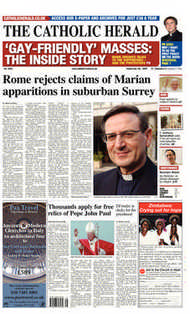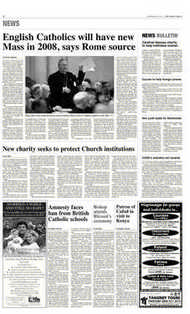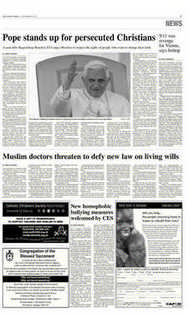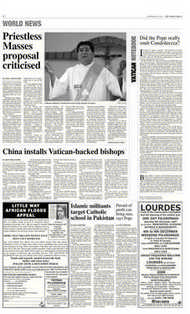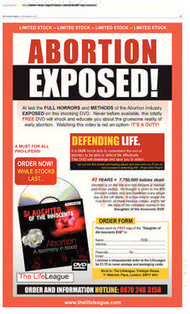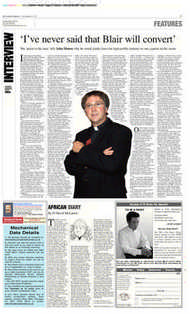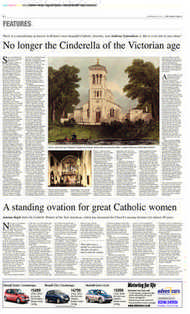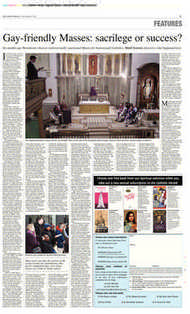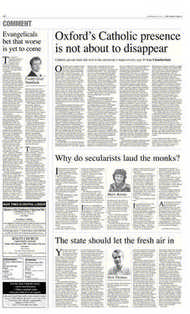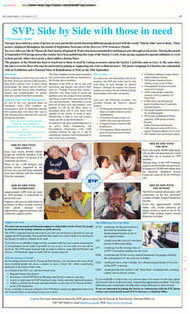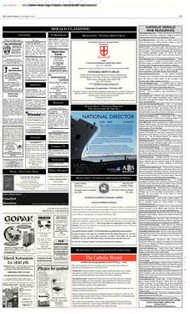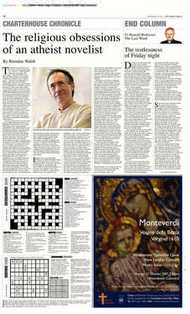Page 3, 28th September 2007
Page 3

Report an error
Noticed an error on this page?If you've noticed an error in this article please click here to report it.
Tags
Share
Related articles
Englishman First To Go In Curial Shake-up
Cardinal Invites Uk Muslims To Fight For Religious Freedom
Cardinal Appeals For 'reciprocity' In Islamic Countries
'the Pope Has Not Launched A Crusade'
Benedict Xvi Says Faithful Have 'right And Duty' To...
Stop Persecuting Christians, Cardinal Tells Muslim States
Pope stands up for persecuted Christians
BY SIMON CALDWELL
THE POPE has sharply criticised the treatment of Christians in Muslim countries in a speech defending religious liberty.
Benedict XVI attacked Islamic nations where Christians are either persecuted or given the status of second-class citizens under Islamic law.
He also defended the rights of Muslims to convert to Christianity, an act of apostasy which warrants the death penalty in some Islamic countries.
His comments came almost exactly a year after he provoked a wave of anger throughout the Muslim world by quoting the words of a Byzantine emperor who had linked Islam to violence.
In a speech to 200 people at Castel Gandolfo, near Rome, the Bavarian-born Pontiff said he was compelled to speak in “defence of religious liberty”, which, he said “is a fundamental, irrepressible, inalienable and inviolable right”.
Then, in a clear reference to Islam, he said: “The exercise of this freedom also includes the right to change religion, which should be guaranteed not only legally, but also in daily practice.
“Within every human heart there are needs and desires which find their fulfilment in God alone. For this reason, God can never be excluded from the horizon of man and world history.
“That is why all authentically religious traditions must be allowed to manifest their own identity publicly, free from any pressure to hide or disguise it.” Specifically addressing the problem of Islamic extremism, the Pope added: “Moreover, due respect for religion helps to counter the charge that society has forgotten God: an accusation shamelessly exploited by some terrorist networks in an attempt to justify their threats against global security. Terrorism is a serious problem, and its perpetrators often claim to act in God’s name and harbour an inexcusable contempt for human life.” Last September radical British Muslims said Pope Benedict should be executed for “insulting” Mohammed, the founder of Islam, during a speech at the University of Regensburg, Germany. About 100 Muslims gathered on the piazza of London’s Westminster Cathedral and held up placards reading: “May Allah curse the Pope”, “Pope go to hell”, “Jesus is the slave of Allah”, “Jesus is the messenger of Islam” and “Trinity of evil: Bush, Blair and the Pope”.
Throughout the Middle East and Africa, Christians were subjected to violence in retribution for the remarks. The Pope later apologised for offence caused but insisted that he he had been misunderstood.
His latest comments, however, came just days after one of the Church of England’s most senior bishops warned that people will die unless Muslim leaders in Britain speak out in defence of the right to change faith.
Anglican Bishop Michael NazirAli of Rochester, whose father converted from Islam to Christianity in Pakistan, said he wanted Muslim leaders in Britain to “uphold basic civil liberties, including the right for people to believe what they wish to believe and to even change their beliefs if they wish to do so”.
In a Channel 4’s Dispatches programme last week, Bishop Nazir-Ali told of his fears about the safety of the estimated 3,000 Muslims who have converted to other faiths in Britain. A poll of more than 1,000 British Muslims, conducted by the Policy Exchange think-tank this year, found that 36 per cent aged between 16 and 24 believe those who convert to another faith should be punished by death.
Pope Benedict is particularly concerned about the persecution of Christians in Iraq since the invasion of 2003. Before the Second Gulf War there were about 1.2 million Christians – including 800,000 Chaldean Roman Catholics – in the predominantly Shia Muslim Arab state.
But the overall number of Christians has dropped to below 600,000 in just four years. Christians make up almost half of all refugees fleeing the conflict, according to United Nations figures. Many have sought new lives, mostly in the neighbouring countries of Syria, Jordan and Turkey where they are gathered in their tens of thousands in refugee camps. Seven of the world’s 57 Islamic states – including Iran – impose the death penalty for conversion.
In his speech to the Centrist Democratic International, an international association of political parties promoting Christian democracy, Pope Benedict XVI also warned politicians against undermining the foundations of democracy in their fight against terrorism.
Countries have a right to defend themselves, he said, “but this right must be exercised with complete respect for moral and legal norms, including the choice of ends and means”.
He questioned how a nation could claim to be protecting democracy “if we threaten its very foundations” by acting unconstitutionally. Governments must strike a balance of keeping “careful watch over the security of civil society and its citizens while at the same time safeguarding the inalienable rights of all”.
blog comments powered by Disqus


